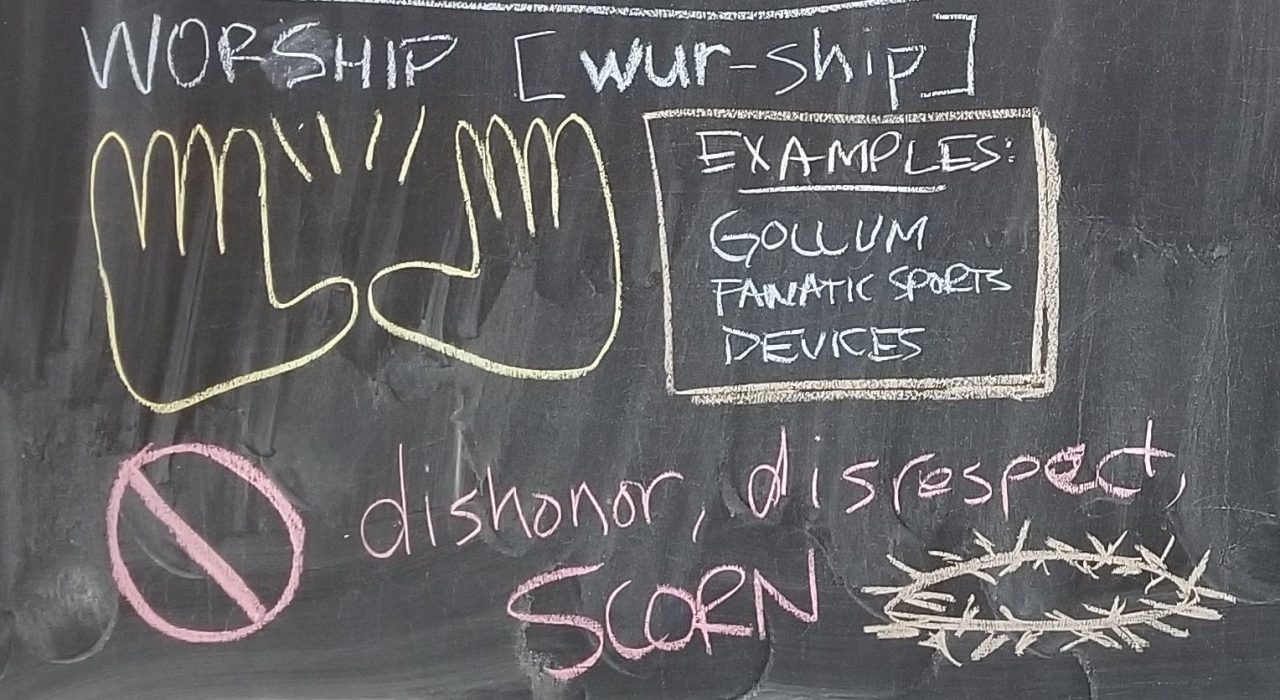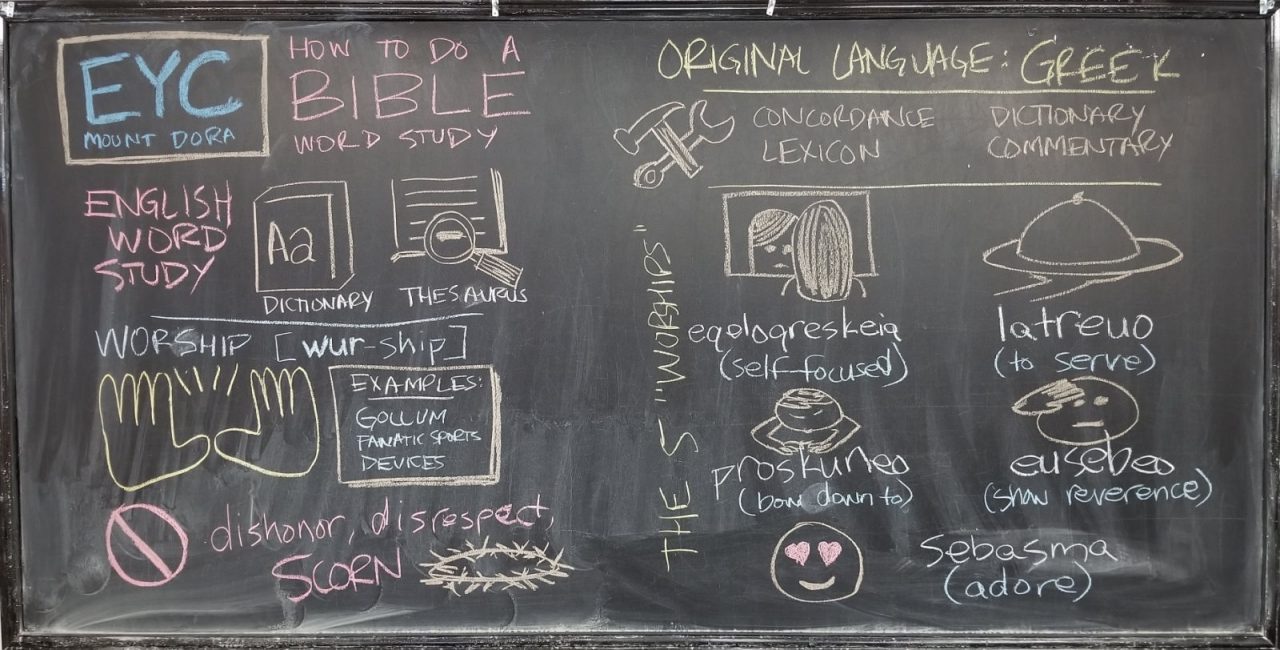Editorial Note: This post is part of how to study the Bible (the complete series).
After building some foundational context for the Bible and understanding the dynamics of the original languages and modern English translations, we can now explore how to do a Bible word study.
The Bible text is so rich with meaning, yet we often read without truly understanding. If you want to get the most out of a Biblical text, it’s important to slow down and dive deeper into the words and language used to communicate the ideas its trying to express. Especially considering the historical and cultural distance, doing a Bible word study can help reveal fuller understanding.
We can approach word study in the Bible from two different angles. First, we can work to explore the English words used to translate the Scriptures into for us. And second, we can do original language (Greek and Hebrew) word studies to access ideas more from the writers’ perspectives.
Let’s look at each of these and do some practical application to illustrate what a good word study might look like.
English Word Study
While English is not the original language, we do know that the translators of many versions of the bible are experts in linguistics. Often, there is great effort put into discovering just the right word selection. So we can (usually) trust that the English words we’re reading are selected with great care.
And because it’s easy to just skim over words we know without really thinking about what they mean, it’s helpful to do a little bit of English word study. Paying attention to fuller details and meanings of the English words used can give us greater insight into the passages we’re reading.

There are two tools, in particular, that are helpful when doing English language word studies:
- Dictionary – I like using a good online dictionary, because not only do they offer the definition of the word, but often you’ll find the etymology with information about the word origin.
- Thesaurus – Not only can it be helpful to see synonyms of the word, but antonyms also point you to what the word does not mean.
Bible Word Study: Worship (English)
Consider the English word worship. According to dictionary.com:
- to render religious reverence and homage to.
- to feel an adoring reverence or regard for (any person or thing).
And according to thesaurus.com:
- Synonyms (noun): adoration, church service, devotion, prayer, rite, ritual, adulation, awe, beatification, benediction, chapel, deification, exaltation, genuflection, glory, homage, honor, idolatry, idolization, invocation, love, offering, praise, prostration, regard, respect, reverence, service, supplication, veneration, vespers, laudation
- Synonyms (verb): admire, adore, canonize, celebrate, chant, idolize, revere, sing, venerate, adulate, deify, esteem, exalt, extol, laud, love, magnify, praise, respect, reverence, sanctify, bow down to, dote on, offer prayers to, pay homage to, pray to, put on a pedestal, sing praises to
- Antonyms: abhor, condemn, despise, detest, hate, blame, castigate, criticize, denounce, dishonor, dislike, disrespect, scorn

My take: There’s certainly a lot in here that we could talk about. But there are a couple things that resonate with me as I write this. First in the origin notes from the dictionary, worth-ship stands out. It shows that worship is directed towards something with worth. It’s really the recognizing and declaring and honoring of something of high worth.
Additionally, from the thesaurus, terms like dishonor and disrespect stand out. These are certainly not things we want in our worship, and doing those things would really be the opposite of something we value (which has ‘worth’). Also scorn is a big one. Because that’s what many did to Jesus (God in the flesh) when He walked the Earth among us. It shows an utter rejection of God. And as hard as people scorn Him, I want my worship to be equally (if not more) extreme.
Original Language Word Study

As valuable as an English language word study can be, going back to the original language can be even more revealing when we’re attempting to discover the writers’ original intent. There are a few great tools to help with this, particularly a good concordance and a good lexicon. There are some great online resources, like Bible Hub, which have all of these tools built into a single resource.
Bible Word Study: Worship (Greek)
The word worship appears in the biblical text many times. But it doesn’t always mean the same thing. These are some examples where an original language word study for that term can impact how you understand the text.

— eqeloqreskeia
See: Colossians 2:23 (KJV): Which things have indeed a shew of wisdom in will worship, and humility, and neglecting of the body; not in any honour to the satisfying of the flesh.”
Strong’s Concordance: self-willed (arbitrary and unwarranted) piety
Thayer’s Greek Lexicon: worship which one devises and prescribes for himself, contrary to the contents and nature of the faith which ought to be directed to Christ; said of the misdirected zeal and practices of ascetics
— latreuo
See: Acts 7:42 (KJV): Then God turned, and gave them up to worship the host of heaven; as it is written in the book of the prophets, O ye house of Israel, have ye offered to me slain beasts and sacrifices by the space of forty years in the wilderness?
Strong’s Concordance: to serve
Thayer’s Greek Lexicon: in Greek writings a. to serve for hire; b. universally, to serve, minister to, either gods or men, and used alike of slaves and of freemen
— proskuneo
See: Matthew 4:9 (KJV): And saith unto him, All these things will I give thee, if thou wilt fall down and worship me.
Strong’s Concordance: to do reverence to; I go down on my knees to, do obeisance to, worship
Thayer’s Greek Lexicon: to kiss the hand to (toward) one, in token of reverence; to fall upon the knees and touch the ground with the forehead as an expression of profound reverence
— eusebeo
See: Acts 17:23 (KJV): For as I passed by, and beheld your devotions, I found an altar with this inscription, TO THE UNKNOWN GOD. Whom therefore ye ignorantly worship, him declare I unto you.
Strong’s Concordance: to show piety towards
Thayer’s Greek Lexicon: to be (pious), to act piously or reverently (toward God, one’s country, magistrates, relations, and all to whom dutiful regard or reverence is due)
— sebasma
See: Matthew 15:9 (KJV): But in vain they do worship me, teaching for doctrines the commandments of men.
Strong’s Concordance: to worship; reverence, worship, adore
Thayer’s Greek Lexicon: to revere, to worship: (a deity)
Best Bible Study Apps
While I’m not looking to offer a deep-level review on each of these apps, here are a few that might be worth checking out if you’re looking for a good app to use on your phone to study the Bible:
- Bible (Android | iPhone/iPad) – Free Bible App with Audio, Verse of the Day, Offline, Daily Study + Devotionals
- Accordance (Android | iPhone/iPad) – The Accordance app makes it easy to view a commentary or study notes in parallel with your Bible or to compare two Bible translations side by side. You can tap on a word in your Bible to learn more about the original Greek or Hebrew, and then tap again to look up the word in a dictionary.
- Blue Letter Bible (Android | iPhone/iPad) – Dig deep into God’s Word with over 15 available Bibles, text commentaries, Hebrew / Greek lexicon, interlinear, dictionaries, word searches, and more. Personalize your study with highlighting, tagging favorite verses, and parallel Bible views.
- Olive Tree (Android | iPhone/iPad) – The Resource Guide makes it easy to study by presenting all the relevant information in your library alongside your Bible passage.
Final Thoughts
As you can see, you can spend a great deal of time soaking up the meaning of a single word. In fact, doing a “one word per day” study is a fun way to really unpack the meaning of a passage. It’s simply focusing on one-word at a time, for an entire day, as you work through a single verse.
Don’t just think about the word for a moment. Soak in it. Dissect it. Play around with it. Consider different ways it’s used. Meditate on it.
And all the while, pray that the Holy Spirit would help you understand it.
Regardless, doing a deep-dive Bible word study is a great way to gain more insight into the meaning of the passages. And that helps us better understand how to apply it to our own lives.





0 Comments